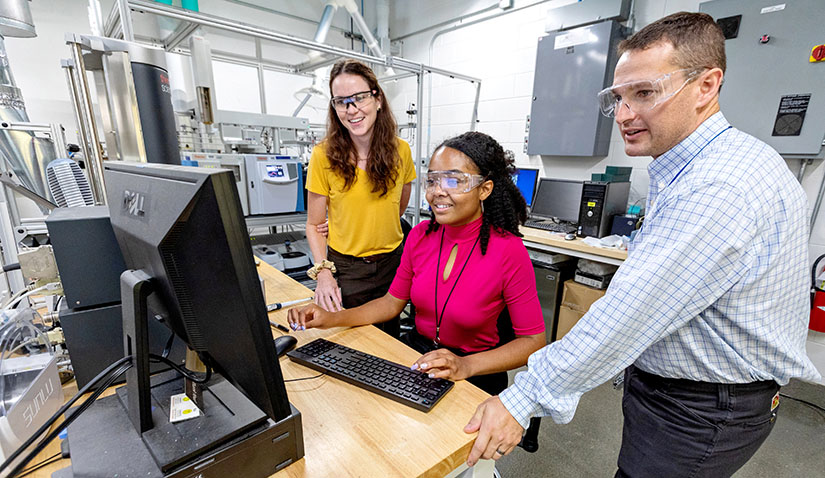Enabling Native Researchers and Other Minorities Through Graduate Education Internship Program
NREL's Enabling Native Researchers and Other Minorities Through Graduate Education (ENRGE) summer internship program offers undergraduate and graduate students at minority-serving institutions hands-on experience in engineering disciplines of power, energy, and cybersecurity.

Apply
Applications are open for summer 2024 ENRGE internships through Jan. 31, 2024.
Program Background
ENRGE supports world-class research opportunities for both graduate and undergraduate engineering students enrolled in programs at minority-serving institutions with underrepresented backgrounds—such as Native, Black, Asian, Hispanic, and Latino Americans. The program provides robust professional development, technical trainings, focused mentoring, and hands-on experience in cross-laboratory research and development projects to support workforce development for the clean energy industry.
NREL is a key member of the ENRGE consortium, a program funded by the National Nuclear Security Administration’s Minority Serving Institution Partnership Program. Other members of the consortium include Navajo Technical University, Alabama A&M University, Florida International University, the American Indian Higher Education Consortium, Sandia National Laboratories, and Idaho National Laboratory.
Eligibility
Eligible applicants must:
- Be enrolled in a minimum of 12 credit hours as an undergraduate or 9 credit hours as a graduate student
- Have maintained a minimum cumulative GPA of 3.0 in the last completed semester.
The program has a strong preference for candidates enrolled in ENRGE consortium schools and other minority-serving institutions.
What Interns Can Expect
ENRGE interns will work alongside NREL researchers during a summer internship on research topics that could include but are not limited to:
- Characterization of the potential for U.S. electric grid disruption from natural hazards and human threats
- Assessment of the cybersecurity of distributed energy systems
- Strengthening of the resilience of the U.S. electric grid.
Through these research, development, and demonstration projects, interns will gain in-depth knowledge of and research experience in topics such as intrusion detection and prevention systems; cryptography; machine learning; private and public key management; software and hardware reverse engineering; information technology; system administration data science; cyber and network analytics; and more.
Interns will become familiar with cross-laboratory programs such as Securing Solar for the Grid, the Wind Cybersecurity Consortium, and Cyber Testing for Resilience Industrial Control Systems. They will also learn about NREL's flagship tools, such as Module-OT, the Distributed Energy Resource Cybersecurity Framework, the Advanced Research on Integrated Energy Systems Cyber Range, and more.
Interns with research interests in NREL's other core research areas are still encouraged to apply. Selected interns will be matched with a mentor and project(s) that best align with their research interests.
The 10-week program starts on the first Monday in June.
NREL allows participants who, for academic reasons, can't start on the first day to begin their internship on a date approved by NREL's workforce development and education manager and ENRGE internship program manager.
Interns meet with program staff to identify projects aligned with their skills and interests. At minimum, interns will complete:
- A pre- and post-internship survey
- A final presentation summarizing their work at NREL.
Other deliverables could include:
- Intern poster session
- Summary report
- Publication.*
*While it might not be possible to deliver a publication during the internship, NREL will offer the opportunity to continue to work on the publication, in coordination with the mentor, and assist in finding the right venue for publication.
Each ENRGE intern will be paired with an NREL research mentor. Mentors may suggest a productive research direction, offer encouragement during a difficult period, help interns gain credit for work accomplished, arrange professional development opportunities and networking, and offer continuing advice.
After ENRGE internships end, mentorship relationships can continue, including offering career advice, networking, and support for publications.
Interns are offered:
- Competitive wages
- Round-trip relocation costs
- Housing stipend.
Other benefits include:
- An EcoPass for public transportation
- Access to NREL’s voluntary 403(b) Employee Savings Plan
- Confidential assistance through NREL’s Employee Assistance Program
- An option to participate in medical, dental, and vision insurance plans if working 20 or more hours per week.
Visiting NREL
ENRGE interns should consider the following before arriving at NREL.
Traveling by Air
Selected students are provided with round-trip, domestic travel to and from NREL. Students make their own travel arrangements and will be reimbursed after arriving at NREL.
Traveling by Car
Students who travel by car will be reimbursed up to $500, depending on mileage.
Housing
Interns will be offered either a housing stipend or paid accommodations. NREL does not have on-site housing.
Students may conduct research at NREL's main campus in Golden or at the Flatirons Campus near Boulder.
Contacts
Danish Saleem
Senior Cybersecurity Researcher and ENRGE Program Manager, Energy, Security, and Resilience Center
Chelsea Quilling
Cybersecurity Researcher and Program Coordinator, Energy, Security, and Resilience Center
Share
